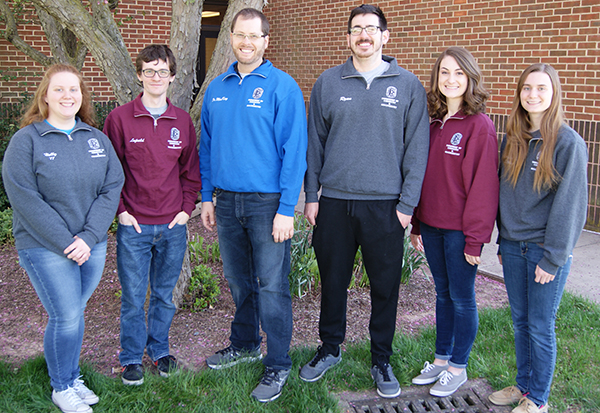 James MacKay, associate professor of chemistry, recently was awarded funding for “Nucleobase-Modified Peptide Nucleic Acid for Sequence Selective Triple-Helical Recognition of Non-Coding Ribonucleic Acid (RNA),” a collaborative proposal with Eriks Rozners, professor of chemistry at Binghamton University in New York. The grant enables MacKay and collaborators to delve into a much deeper look at RNA (ribonucleic acid) a critical molecule vital for all living things.
James MacKay, associate professor of chemistry, recently was awarded funding for “Nucleobase-Modified Peptide Nucleic Acid for Sequence Selective Triple-Helical Recognition of Non-Coding Ribonucleic Acid (RNA),” a collaborative proposal with Eriks Rozners, professor of chemistry at Binghamton University in New York. The grant enables MacKay and collaborators to delve into a much deeper look at RNA (ribonucleic acid) a critical molecule vital for all living things.
The project aims at the development of new methods for molecular recognition of biologically significant, non-coding RNA. The majority of cellular RNA consists of non-coding RNAs that play significant roles in regulating gene expression even though these processes are not fully understood. “There’s all this RNA in our body that we don’t know about,” MacKay said.
All of the students in chemistry are involved in research in some way.”
This fall, MacKay packed his lab coat and headed north to Binghamton to study with Rozners as part of a yearlong sabbatical to jumpstart the research. The $196,000 NSF grant also allows E-town students to participate in RNA exploration in their independent research at Elizabethtown and as part of a capstone laboratory called integrated lab.
Amanda Williams, a E-town senior biochemistry major, was approached in her sophomore year after taking an organic chemistry class with MacKay. Her 2016 Summer Scholarship, Creative Arts and Research Projects endeavor used computer modeling to predict target molecules. Now, having applied the models, she is making the targets via a hands-on approach. Those molecules are sent to Rozners and MacKay to form the backbone of their research. “Being involved in any type of research, you get to learn about something you wouldn’t have,” Williams said. “It’s allowed me to critically think and be involved in something that’s kind of cutting edge.”
Williams is required to earn research-hour credits for her major; spends eight to 12 hours each week in the lab, synthesizing molecules, she said. “It’s very interdisciplinary. It’s a lot of different fields coming in, which you don’t get if you do just a straight organic synthesis project.” She cited computational studies, organic chemistry, analytics and biology as some of the scientific areas she utilizes in her present research.
While Williams and MacKay said the research is pioneering, the professor emphasizes that Elizabethtown students have much to gain regardless of the research progress. “All of the students in chemistry are involved in research in some way, and we’re always going after interesting applications,” he said. “We’re showing them a broader picture of what research looks like.”
That broad approach to exploration is appealing to Williams. “All research should be novel, but here we have an idea that we’ve taken to the next level,” she said.
In the future, MacKay hopes to take E-town student researchers to Binghamton for a workshop, with the purpose of showing them what graduate studies look like and to test their molecules. Until then, students are finding satisfaction in having a hand in the preliminary professional research.

